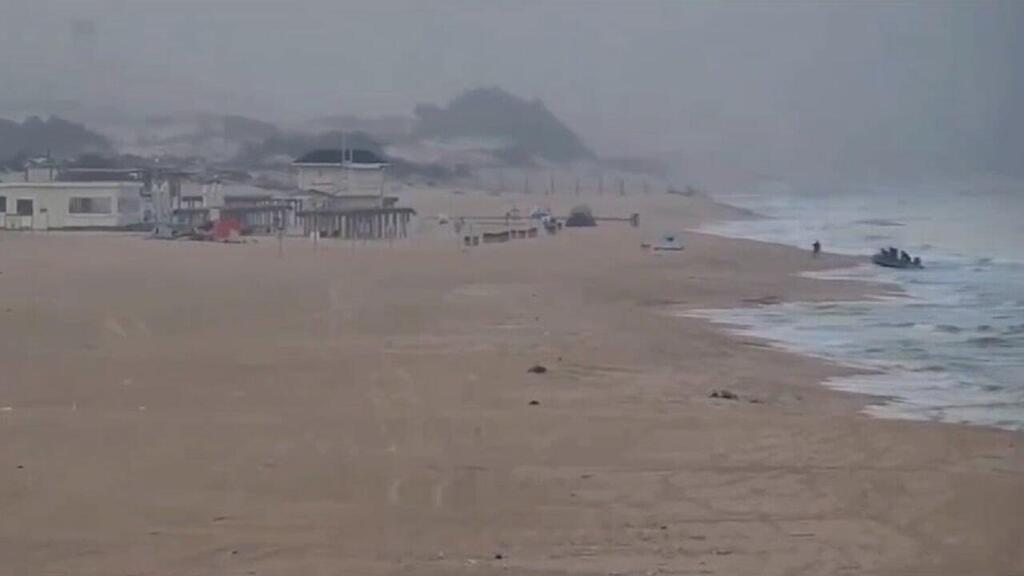Naval control units played a crucial role during the October 7 attack, being the first to identify the infiltration of Hamas naval commandos via the sea. This was explicitly detailed in the Israeli Navy's investigation published last week.
Lieutenant S., a 21-year-old who served as the shift supervisor that morning, was the one who declared, over the communication system, a confirmed infiltration into Israel, enabling the Navy forces and 916th Flotilla from Ashdod base to respond quickly and prevent a larger disaster.
Terrorists infiltrating via Zikim Beach on Oct 7
Thanks to her vigilance and the alerts she issued along with her shift colleagues, security forces were prepared in Zikim and managed to prevent a more severe infiltration into the kibbutz. The Navy successfully destroyed five out of seven Hamas attack boats. However, their valiant efforts notwithstanding, 16 terrorists managed to reach the shore, where they carried out a massacre of civilians, murdering 17 people.
In an interview with Ynet and its sister publication Yedioth Ahronoth, Lieutenant S. described the moments of pressure and how she and nine other control operators dealt with the extraordinary event. She said that declaring the maritime infiltration was an unforgettable moment when she fully realized the magnitude of the responsibility on her shoulders. Alongside tight cooperation with fighters at sea, control operators worked tirelessly to guide the forces and try to prevent a larger disaster.
Following the harrowing experience, Lieutenant S. decided to stay in the military and become an officer, driven by a desire to apply the lessons learned and mentor the next generation of control operators to protect the State of Israel.
Navy's investigation of October 7
"This was a completely normal shift, a calm night shift with nothing unusual," recounted Lieutenant S. "At 6:30, alarms and red alerts started sounding in the Gaza border region, and we began sensing that something was happening. A few minutes later, we detected targets moving rapidly northward.
"At first, we thought they were Gazan fishing boats we’re accustomed to seeing on a daily basis. But then we saw them crossing the border. At that moment, I declared over the communication system that there was an infiltration event, and from there, things unfolded. We detected more and more targets arriving one after the other.
"We called and scrambled forces. We called the Zikim security officer several times and warned him about a terrorist cell heading toward Zikim. Although we’re responsible for the maritime border, there are also assets on land that could be affected by this, and we tried to respond to every incident and issue alerts. We succeeded to some extent because, in the Zikim area, they were prepared with a rapid response team thanks to our warning. We prepared them for the arrival of the terrorists, as well as other positions along the coast."
'We realized this was the point of no return'
She described how, initially, there was hysteria and panic, but they quickly composed themselves and began acting: "As the shift supervisor, I tried to manage the event together with the control officer on duty in the operations center. We tried to understand what was happening, calm the other operators, and take control of the situation," she recalled.
Lieutenant S. and her shift colleagues were determined to prevent the entry of hundreds of terrorists. "From the moment we identified the targets, we guided the Dabur patrol boats at sea to intercept the targets, even as they came under fire. Targets continued advancing northward, and some were stopped just before reaching sensitive coastal areas," she said.
"We managed to stop some boats, but others landed on the shore. One by one, the targets reached Zikim beach, and the last one landed at the Erez post on the shore. The terrorists disembarked from their rubber boats, threatening the forces stationed there and even firing anti-tank missiles at sea.
IDF foils infiltration attempt
(Video: IDF Spokesperson's Unit)
"We discovered other Hamas rubber boats that landed near the lifeguard's station—a civilian gathering point where there was also an infantry force. We identified the boats landing and starting to carry out a massacre of civilians. We tracked each boat and directed our forces to intercept them. Some were successfully intercepted, others weren’t. We did everything we could. It’s a very large sector, and this event extended far beyond the landing of Hamas forces. By 7:30 a.m., all the terrorists had landed, and we began a pursuit to locate them all along the 2.5-mile coastline. They were hiding among the bushes, and we finished intercepting them with the help of the Dabur boats at sea."
'Nothing prepares you for this moment'
"What I remember most from that morning is the realization that this was the point of no return; the event was happening, and it wasn’t just a localized incident—it was targets crossing northward," she said of those moments on that horrendous Saturday. "The moment I declared the border crossing and the raid on the shore is one I’ll never forget. It was a moment where I tried to do my best because I understood civilians could be harmed, and that’s why I do this job."
Lieutenant Z. added: "I didn’t expect this, certainly not during a routine shift that began so normally. Nothing prepares you for this moment or gives any sign that something different would happen during this shift. I didn’t think I’d witness such a situation during my service because it’s not something that’s happened or been seen recently. During routine operations, we dealt with other threats, like Gazan fishermen encroaching into restricted areas. I didn’t think I’d be on a shift where everything would change so drastically. No one expected this level of intensity."
Get the Ynetnews app on your smartphone: Google Play: https://bit.ly/4eJ37pE | Apple App Store: https://bit.ly/3ZL7iNv
Although control operators prevented a greater disaster and achieved significant successes in certain instances, according to IDF investigations, she still feels a heavy sense of responsibility and guilt. "During the event, it’s hard to grasp that the border under my responsibility was breached and that I was responsible for ensuring the maritime border wasn’t penetrated. When targets crossed the border, I declared it over the communication system and realized they were heading for the shore. It’s very hard to accept that the border was breached and that I wasn’t able to fulfill the mission. We did everything we could, but we failed in the end. The sense of guilt doesn’t change. In the end, it doesn’t matter if it was one person on the shore who didn’t return or 18. Ultimately, it’s people I was supposed to protect, and I didn’t fulfill my mission. It doesn’t matter if people tell me I did a good job. It’s nice to know we prevented a larger disaster, but it doesn’t lessen the guilt—it’s hard. The shift ended, and I understood the outcome."
'We are their eyes, and they are our strength'
"We had great cooperation with the fighters at sea, who understood the event very quickly and immediately engaged," she emphasized, crediting the success to the fighters on the ground.
"They were with us throughout the event, and we had significant collaboration. Ultimately, following the instructions they received from the base commander, after he declared a confirmed terrorist attack, they did everything to neutralize the targets we directed them to. We are their eyes, and they are our strength. Control operators will always work hand-in-hand with the fighters at sea. It’s inevitable."
Lieutenant S. enlisted as a naval control operator, but following the events of October 7, she decided to remain in the military and become an officer in the same unit where she served that fateful Saturday. "I always wanted to be an officer, but during my service, I thought it wouldn’t work out," she shared.
"After October 7, everything suddenly fell into place, and I realized I wasn’t ready to leave. I wanted to give more of myself and contribute more to the system, both professionally and as a leader. Another colleague who was on the same shift decided with me to go to officers’ training, and the base fully supported us. We went to officers’ training after already being in mandatory service, all to return here and bring the lessons and insights, and to be part of the next generation of the army and the defense of the State of Israel."






